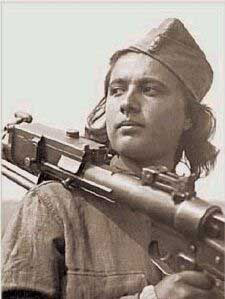Greece 1947-49

A soldier of the DSE (anti-royalist) army
During World War II, the communists played the leading role in the Greek resistance to German occupation; after the British landed and the Germans retreated, fighting broke out between the communist forces and the newly-installed Greek government. The British squarely backed the government side, using infantry, artillery, and air power to attack the communists, whom they drove from Athens . A ceasefire was then concluded, with the communists agreeing to demobilize. But in March 1946, fighting broke out again, and the British, short of money and troops, finally informed the U.S. (with whom they had closely consulted all along) that they would have to reduce their presence in Greece . As we saw in chapter three of the book, this triggered American aid, not to mention the Truman Doctrine pledging “to support free peoples who are resisting attempted subjugation by armed minorities or by outside pressures.” The U.S. established an army group charged with furnishing equipment and supplies to the Greek government forces and advising them in the use of that material; the British, however, would maintain a military mission and continue training the Greek army.
As the war heated up and the British began making plans to withdraw their remaining troops, U.S. officials began to consider expanding their involvement. The possibility of sending U.S. combat troops was considered but rejected for a variety of reasons: worry that the U.S. would be spread thin, that neighboring countries or even the Soviet Union would counter and hold the troop advantage, and that the responsibility was in the end that of the Greeks themselves. Instead, the U.S. increased the number of advisers and ordered them to go on field operations; it appears that the advisory effort extended down to the battalion level. The British were also persuaded to keep their troops in place. Meanwhile, the U.S. financed an expansion of the Greek army and shipped more and better equipment. With improved close air support (from British- and U.S.-supplied planes), including the use of dive bombers and napalm, these various measures began to roll back the insurgency, which was finally given its coup de grace when Tito closed the Yugoslav border and the guerrillas could no longer take sanctuary. 1
1) Kolko (1968: ch. 8); Kolko and Kolko (1972: ch. 8); Shafer (1988: 175-7); Jones (1989: 47-9, 129, 159, 170, 221, 291); Cooper (2003a). The quotation on support is from Truman's 12 March 1947 address to Congress (widely available online and in print) and is the core of what quickly became known as the Truman Doctrine.
